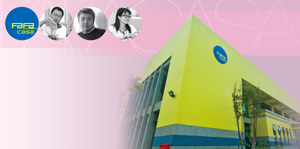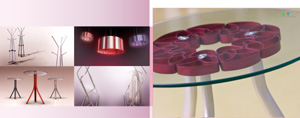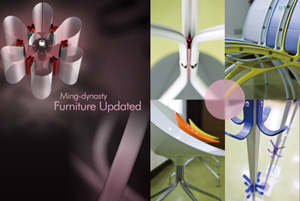Founder Aluminum Co., Ltd.
Designer furniture
2009/06/25 | By Ben Shen | FOUNDER ALUMINIUM CO., LTD.A real-life story of successful diversification, Founder Aluminum Co., Ltd. has transformed from a small aluminum sand-casting shop to gravity-casting plant, and now is turning out designer furniture, branching out from being OEM/ODM (original equipment/design manufacturer). The maker even originated its “FaFaCaSa” brand last year to help identify itself as a designer furniture concern, aspiring to eventually equate such brand with high-end furniture.

Founder Aluminum was established in 1978 in Fengyuan of Taichung County, central Taiwan. Having engaged in sand casting and gravity casting till the early 1990s, the company in 1993 began filling ODM orders placed by Japanese firms such as TOTO, Muji and Panasonic. The years since have seen the company grow quickly as a maker of finished furniture.

Founder Aluminum's big break came in 1998 when the IKEA Group of Sweden began ordering aluminum/glass cabinet doors, on which the maker installs patented slideways. IKEA has become Founder Aluminum's bread-and-butter by placing steady, volume orders, with the company supplying 35% of the aluminum/glass cabinet doors distributed by IKEA worldwide, with such sales to IKEA commanding 70%-80% of Founder Aluminum's total sales.
Founder Aluminum says long-term cooperation with IKEA enables it to grow soundly, while crediting its own cost-effective production as one of the major reasons for being picked by IKEA as a long-term partner. Another reason would be product quality: the company imports high-end aluminum ingots, rather than aluminum billets, from Dubai and Canada, claiming that using such aluminum enhances quality control throughout production.

Expanded Operation
Backed by steady growth, Founder Aluminum in 2003 expanded by setting up headquarters with a new production facility sizing 10,000 pings (one ping equals to 36 square feet) at the Changhua Coastal Industrial Park (CCIP) in central Taiwan, with the plant having grown to 17,000 pings.
Still focused on ratcheting up automation, Founder Aluminum now boasts automated production exceeding 70% at its CCIP plant. “Automated production helps us upgrade product quality by enhancing consistency that meets customers' requirements,” Lin says.”
The company even installs many self-designed, dedicated production equipment exclusive to Founder Aluminum. “We have spent a lot of money in designing dedicated production tools. But such effort has paid off because they help to streamline automated production by far and without interruption,” asserts Lin.
Lin attributes his company's capability of rolling out price-competitive aluminum furniture to not only automation but also a rare satellite-plant system. The company works with three subcontract packaging lines in-plant, which helps cut lead time and shipping cost.

Despite being cushioned by steady sales to IKEA, Founder Aluminum knows that over-dependence on a single client is risky. “Although IKEA pays much attention to product quality, it also prefers to procure price-competitive products globally,” Lin comments. “We still have stable relations with the furniture giant, but we have to be ready for a rainy day. That's why we have diversified into designer furniture.”
In-house Designers
Being ambitious to build its own-brand designer furniture, Founder Aluminum knows the importance of cultivating in-house talent as it continues to groom eight or so in-house designers with abundant background in industrial design. The company says it will never scrimp on such training.
To build credibility as a maker of designer furniture, Founder Aluminum promotes the value of original design and protects intellectual property by having the names of in-house designers inscribed in the products, especially those shipped to the Japanese market.
To help stimulate the work of its in-house designers, as a form of on-the-job training, the maker has over the past several years been cooperating with six renowned design houses, which also enables the introduction of global, cosmopolitan input. Such program is further supplemented by inviting monthly well-known designers from Japan to come for tutorials.
To enhance product added-value, Founder Aluminum has been working with other domestic furniture manufacturers with expertise in non-aluminum materials. “To cope with fierce competition, domestic furniture manufacturers have to partner to boost competitiveness to survive in the international marketplace,” comments Lin. “Although we concentrate on aluminum furniture, we have to procure high-end accessories of other materials to boost product value and meet customers' requirements. Over the past few years, we have built considerable synergy with domestic furniture manufacturers specializing in iron-wire and glass furniture.”
Ming-dynasty Furniture Updated
Backed by its in-house designers who are finding inspiration among the cultural remnants left by the Spanish, Dutch and Japanese colonizers in Taiwan, Founder Aluminum is preparing to create a line of Ming-dynasty furniture but in updated aluminum versions.
With headquarters in Lukang, one of Taiwan's oldest small towns, the maker has found some seasoned artisans and craftsmen with expertise in designing Ming-dynasty furniture, who will play key roles in realizing modern, aluminum interpretations of the venerable Ming-dynasty furniture.
Instead of going with the flow, Lin claims his company can design brand-new products to create demand by promoting such products at well-established, international furniture shows. In October this year, the company will exhibit its Ming-dynasty aluminum furniture in Germany, aiming to win the coveted German “iF” Awards, a globally-recognized industrial design contest that could stamp its new line of Ming furniture with the seal of approval.
Eco-friendly
Besides being profit-driven, Lin believes entrepreneurs are obliged to be socially-responsible corporate citizens with a duty to protect the ecology. Toward such end and knowing the recyclability of aluminum furniture, Founder Aluminum guarantees the users in the Japanese market that it recycles aluminum furniture by donating them to World Vision, a Christian charity dedicated to helping children, families and communities to overcome poverty and injustice.
Lin says more than 70% of scrap aluminum furniture is recyclable, estimating that aluminum accounts for approximately half of the total production value in its furniture.
Founder Aluminium Co., Ltd.
No. 1, Gongye W. 1st Rd., Lugang Town Changhua, Taiwan 505
Tel: 886-4-781-1711
Fax: 886-4-781-3583
http: www.fafacasa.com
E-mail: web@fafacasa.com




